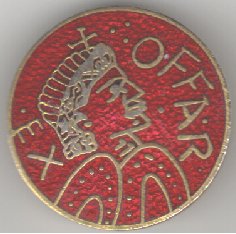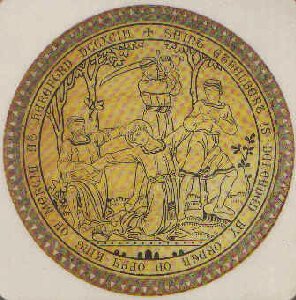|
|
|

The genesis of the Anglo-Saxons
Following the withdrawal of the Italian Roman Legions from Britain, the island was harassed by pirates and invaders from Germania. Angles, Saxons and Jutes invaded, and settled in Britain, continuing the lifestyle documented by Tacitis in his "Germania"; the tribes lived and fought in a Warband, a Comitatus, led by their "king", their chieftan, to whom they pledged their loyalty, if he provided them with the gold, booty and security they sought. As they settled, the invaders established their culture in Britain, and their warbands grew into larger kingdoms; those of the West, South and East Saxons; the East Angles; the Mercians; those of Lindsey, Deira and Bernicia. By the kings of these realms began to vie for supremacy over each other, and the most powerful earned the title"Bretwalda", the king of the British.
The advent of Christianity
The Anglo-Saxon kingdoms followed the Germano-Norse Pagan religions of their ancestors, until encountering the Christian missions of Rome. St. Augustine landed in England as emissary from Pope Gregory the Great, to convert the English to Roman catholicism. Roman missions had had success in Ireland, and Celtic priests and monks arriving in Scotland and northern England set about reviving the religion there. The Anglo-Saxons took to it enthusiastically, as those Kings who converted enjoyed the success in battle over their Pagan rivals that convinced them that this was the thing to do. Initially the Northumbrians held the balance of power in England, but soon, it was the midland kingdom of Mercia that came to the fore.
The Mercian Supremacy
The Mercian Kingdom bordered Powys and Gwynnedd in the west, and Wessex lay to the south , over the Thames. The east bordered with the East Angles, and the Northumbrians lay northwards. The King Penda (inventor of the "penny") was able to make the kingdom more cohesive as a whole, so much so that his son Wulfhere was able to secure the recognition of Overlord of Southern England (the strongest king rather than the ruler). A wane and a couple of rulers later, and Penda's brother's grandson AEthelbald was king, and the venerable Bede records that in 731, all English kingdoms south of the Humber recognised his power. He used a Latin version of Bretwalda, ruler of the British, in his charters. Wessex became, largely, a Mercian Province, and AEthelbald ruled for forty one years. This ended with his murder by his bodyguard near the principal Mercian city of Tamworth in 757. The kingship was inherited by another of descendant of Penda's brother Eowa: Offa.
Offa Bretwalda
Offa's early reign was
unremarklable; following AEthelbald's death, the power of the Mercians had
shrunk back to the south midland borders. But by around 775, it seems that Offa
had extended his power to Kent, as charters of the time show the Kentish kings
as mere clients to the Mercian overlord, following the extinction of the strong
Kentish dynasty. In 771, he was granting land in Sussex, although the West
Saxons were largely independent under Cynewulf until 786, when Offa supported a
rival in taking the throne as a client king.
Ethelbert of East Anglia
"792- In this year King Offa, King of the Mercians, ordered King AEthelberht's head to be struck off" - the Anglo-Saxon Chronicle.
Offa's Dyke and Sutton Walls
*forthcoming*
The relations with Charlemagne
*forthcoming*
![]()
Picture of Offa coin and Islam debate
Offa and Islam article